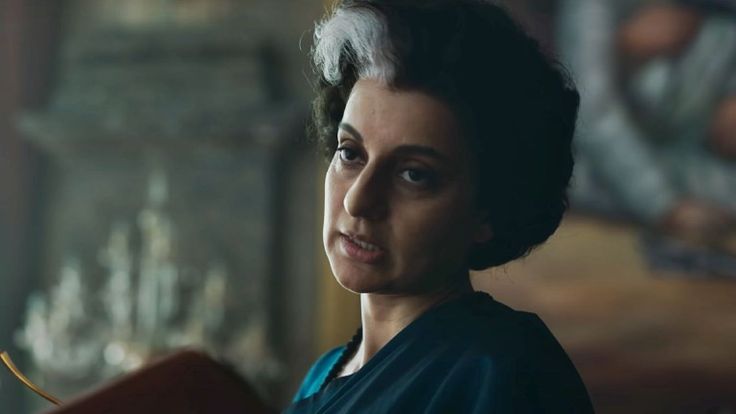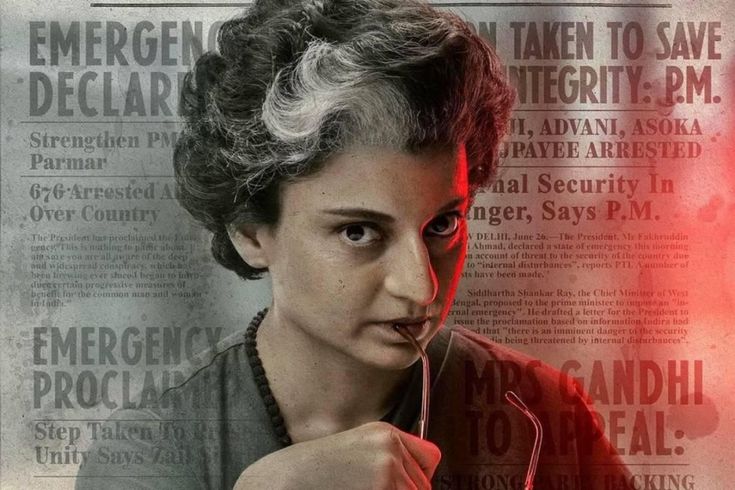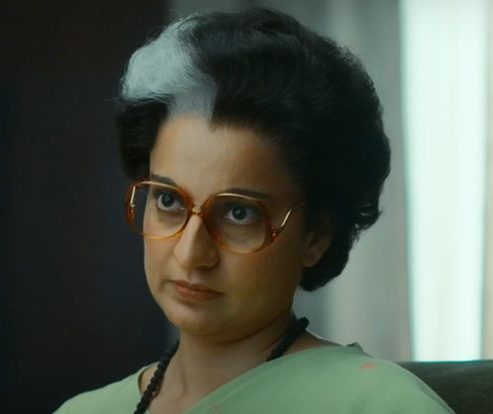Emergency (2025) is a Hindi-language political drama directed by and starring Kangana Ranaut as former Indian Prime Minister Indira Gandhi. The film delves into the tumultuous period of Indian history from the early 1960s through the 1980s, focusing on Gandhi’s political career and the controversial 21-month Emergency she declared from 1975 to 1977.
Plot Overview
The narrative traces Indira Gandhi’s ascent to power following the death of her father, Jawaharlal Nehru, highlighting her role as India’s first and only female Prime Minister. The film portrays significant events during her tenure, including the Indo-Sino war, the formation of Bangladesh in 1971, and her relationship with her younger son, Sanjay Gandhi. Sanjay’s controversial involvement in politics and the implementation of policies like the forced sterilization campaign are depicted as pivotal factors leading to political unrest. Facing mounting opposition and internal party dissent, Gandhi declares a state of emergency, suspending civil liberties and censoring the press, actions that have been widely criticized and debated in Indian history. IMDb
Cast and Characters
-
Kangana Ranaut as Indira Gandhi: Portrays the complex persona of the Prime Minister, navigating political challenges and personal dilemmas.
-
Anupam Kher as Jayaprakash Narayan: Depicts the prominent political leader who opposed Gandhi’s emergency declaration.
-
Shreyas Talpade as Atal Bihari Vajpayee: Represents the future Prime Minister and a significant political figure during the Emergency.
-
Milind Soman as Field Marshal Sam Manekshaw: Portrays the Chief of the Army Staff during the Indo-Pakistani War of 1971.
-
Mahima Chaudhry as Pupul Jayakar: Plays Gandhi’s confidante and biographer.
-
Satish Kaushik as Jagjivan Ram: Depicts the senior political leader and a key figure in the Indian National Congress.
Release and Reception
Initially slated for release in 2023, Emergency faced multiple delays due to certification issues and political controversies. The film was eventually released theatrically on January 17, 2025, and began streaming on Netflix from March 17, 2025. While the film received praise for its performances and production design, it also attracted criticism for historical inaccuracies and its portrayal of sensitive political events.
In April 2025, veteran journalist and author Coomi Kapoor filed a lawsuit against Kangana Ranaut’s production company, Manikarnika Films Pvt Ltd, and Netflix. The legal action pertains to the upcoming film Emergency, directed by Ranaut, which dramatizes the political events surrounding India’s Emergency period in the 1970s.
Kapoor alleges that the film inaccurately portrays historical events and misrepresents content from her 2015 book, The Emergency: A Personal History. She claims that there was a contractual agreement stipulating adherence to historical facts and prohibiting the use of her name and book for promotional purposes without consent. Kapoor asserts that her attempts to address these concerns directly with the producers were unsuccessful, leading to the lawsuit.
The Central Board of Film Certification (CBFC) granted Emergency a U/A certificate on the condition that the filmmakers implement specific cuts and provide factual sources for controversial historical claims depicted in the movie.


-
Mandated Adherence to Historical Facts:
The contract explicitly required the film’s content to align with “historical facts in the public domain”. This clause aimed to prevent fictionalized or distorted portrayals of events documented in Kapoor’s book The Emergency: A Personal History. -
Restricted Use of Kapoor’s Name/Book:
-
The agreement prohibited promotional use of Kapoor’s name or book title without her written consent.
-
Despite this, the film’s Netflix disclaimer labeled it as “based on” her work (later changed from “inspired by”), violating the clause by implying endorsement without consultation.
-
-
Scope Limitation:
The rights granted were limited to a single chapter of Kapoor’s book focused on Indira Gandhi, restricting the filmmakers from extrapolating beyond the agreed-upon content1. -
Script Oversight:
Kapoor’s legal team inserted clauses to ensure creative accountability, though the filmmakers allegedly failed to share the script or consult her during production, leading to distortions.
Key Breaches Identified:
-
Misattribution of Events: E.g., blaming Akbar Ahmad (not V.C. Shukla) for banning Kishore Kumar’s songs.
-
False Depictions: Including the fictionalized arrest of journalist Nikhil Chakravarty.
-
Timeline Errors: Misrepresenting the Emergency’s revocation timeline.
These clauses were intended to preserve the integrity of Kapoor’s work and ensure factual fidelity, but the filmmakers allegedly bypassed these safeguards, prompting the lawsuit
Coomi Kapoor identified several specific historical inaccuracies in Emergency that conflict with her book The Emergency: A Personal History and public records:
-
Ban on Kishore Kumar’s Songs
The film blames Akbar Ahmad (Sanjay Gandhi’s friend) for banning Kishore Kumar’s songs on All India Radio. Kapoor’s book explicitly states V.C. Shukla (then Information and Broadcasting Minister) was responsible. -
Timeline of Emergency Revocation
The film inaccurately suggests the Emergency was revoked during Indira Gandhi’s tenure. Kapoor clarifies it officially ended after her 1977 electoral defeat, not earlier as depicted. -
Falsified Arrest of Journalist Nikhil Chakravarty
The movie portrays journalist Nikhil Chakravarty as jailed during the Emergency. Kapoor asserts he was never imprisoned during that period. -
Misleading Title and Promotional Claims
-
The film’s title (Emergency) closely mirrors Kapoor’s book (The Emergency: A Personal History), which she calls a “deliberate attempt” to leverage her work’s credibility.
-
Netflix’s disclaimer shifts from “inspired by” to “based on” Kapoor’s book, violating contractual terms that barred using her name/title for promotion without consent.
-
-
Conflation of Events
Kapoor alleges the film distorts timelines (e.g., merging the Emergency’s revocation with unrelated events) and misrepresents documented facts about key figures’ roles
Kapoor emphasized these errors damage her credibility as a historian and breach her contract, which mandated adherence to “historical facts in the public domain
This legal dispute adds to the ongoing controversies surrounding the portrayal of historical events in Indian cinema, highlighting the challenges filmmakers face in balancing creative expression with factual accuracy.
veteran journalist Coomi Kapoor filed a lawsuit against Kangana Ranaut’s Manikarnika Films Pvt Ltd and Netflix, alleging that the film Emergency misrepresents historical events and misuses content from her 2015 book, The Emergency: A Personal History. Kapoor claims that the film inaccurately portrays events from the Emergency period and misrepresents content from her book, despite a contractual agreement that stipulated adherence to historical facts and prohibited the use of her name and book for promotional purposes without consent. Wikipedia
The lawsuit also alleges that Kapoor’s attempts to address these issues directly with the producers were unsuccessful, leading to legal action.
The Central Board of Film Certification (CBFC) granted Emergency a U/A certificate on the condition that the filmmakers implement specific cuts and provide factual sources for controversial historical claims depicted in the movie.
The film has faced significant backlash from Sikh organizations, particularly the Shiromani Gurdwara Parbandhak Committee (SGPC), which accuses it of distorting historical events related to the 1984 anti-Sikh riots and defaming the Sikh community.
As of now, Kangana Ranaut has not publicly responded to the lawsuit.
Regarding the tripartite agreement between Coomi Kapoor, Penguin, and Manikarnika Films, specific details have not been publicly disclosed.
There is no publicly available information detailing how Kapoor discovered the alleged inaccuracies in the film.
Aksht Ranaut, Kangana Ranaut’s brother, is listed as a producer for Emergency. However, his specific role in the controversy has not been detailed in publicly available sources.


-
Silence from Netflix:
-
Multiple outlets (Indian Express, New Indian Express, ThePrint) confirmed Netflix had not responded to media inquiries about the lawsuit.
-
An unnamed industry source cited by Hindustan Times (via Indian Express) suggested Netflix, as a distributor, might argue it bears no liability for content accuracy, shifting responsibility to Manikarnika Films.
-
-
Kapoor’s Claims Against Netflix:
-
Kapoor contends Netflix’s retention of the disputed disclaimer (“based on Coomi Kapoor’s book”) perpetuates misinformation, violating her contractual rights.
-
She demands removal of her name/book references from the platform and compensation for reputational harm.
-
Current Status:
Netflix’s legal team and PR representatives have remained silent publicly, with no acknowledgment or resolution announced. Kapoor’s lawsuit is pending in the Delhi High Court.
Key Conflict:
The dispute hinges on whether Netflix, as a licensed distributor, shares liability for contractual breaches by the production house. Legal experts suggest streaming platforms often rely on indemnity clauses, but Kapoor’s case could set a precedent for accountability in historical adaptations
READ MORE: Ready Or Not 2: Cast, Plot, And How The Sequel Levels Up The Original Horror Hit


